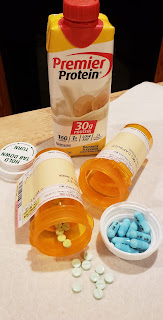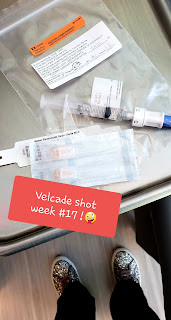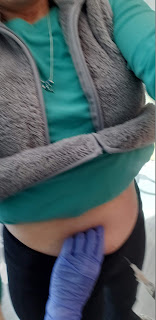Hello 1.29.19
No new news to report from my status on 1.19.19
Hoping my stats are even better in February!
I am so thankful this triplet of Velcade, Cytoxan, 40mg Dex steroids is making a dent in overpowering Myeloma... well making a dent to an extent, somewhat, that is. My IGA didn't plummet to normal or anywhere near lol, but it certainly moved in the right direction! Last labs you can see on my previous post show I am still 3x the High End of Normal, but that's sure an improvement on the previous months!
I marvel everyday, every treatment, what my body has been through and able to handle for 9 years. Still this myeloma diagnosis and experience is surreal and an out of body non reality for me. Yet I do what I have to do, daily, weekly, monthly, and so on. "
It Is What It Is"... I tell myself all the time. Carry on Julie, you're not in control any longer... On treatment days I get up and take 10, 4mg Dexamethasone Steroids, which = 40mgs! Then a few hours later, I show up for my Velcade shot. A few hours later I take 8 Cytoxan pills at 50mg each for a total of 800mg. Seriously, how can I be doing this? How does my body tolerate it? I would love if there was a little camera I could ingest, that would show the adventures going on inside of me. How incredible would that be! I'd love to see what is happening to me cellularly, chemically, biologically. I'd love to see how the cancer cells grow, and take over. I'd love to see how the chemos ambush and trick the cancer cells, killing them off, or disabling them. I love science, but I'm not smart enough to fully understand all this amazing stuff!
Yes, I keep believing, hoping new myeloma killing meds
continue to be developed...
saving my life and all my myeloma warriors
10 Dex Steroids + one delish Banana protein shake in the morning.
8 Cytoxan pills + one delish Vanilla protein shake in the late afternoon
I do have nausea later in the night, but not too bad
So far Velcade has Not gifted me with awful Neuropathy!
I avoided Velcade early on, as so many myeloma peers
warned of the awful Neuropathy side effects.
Cross fingers, it continues to work,
with minor side effects!
And here comes the needle!
Not so bad after all.
Amazing what we all can get used to!
My life continues to be consumed in health issues for me and my hubby. Seriously unbelievable. I have been working on Acceptance, letting go of what I thought this time in my life was going to be. Neither of our situations are Curable, and sadly the reality is... we will both continue to decline. I honestly don't think about "Cures", as that just sets one up for disappointments. I think in terms of daily Quality of Life, just getting thru each day with minimal "drama", feeling good- as best we can, finding small joys daily, and always hoping my current treatment lasts a long time, and I don't become "Refractory" to my chemos too quickly.
Fortunately there is a lot of research going on with Myeloma. There are new medications being developed all the time. During the recent American government shut down, I heard it was affecting cancer research, grants, etc. I began to really think of the potential personal impact. Wow, what if my current medications couldn't be produced. What if I suddenly didn't have access to medical care. What if I didn't have access to treatment, in the amazing way I do. What if research and clinical trials were halted. I thought about all the zillions of patients dealing with these issues now and beyond the "shut down". Well, I think about this all the time when I read about patients struggling to be treated, not having access to medical care and life saving medications. I am happy and proud to pay for my insurance, Dr visits, clinical expenses, medication copays, etc. And I know the answer to my above questions, as my stem cell transplant Dr answered those questions few years ago. Remember?
I directly asked him... "What if I decided to stop all treatments? What if I was just tired of all the side effects, my limited Quality of Life from all the chemo meds, and decided to STOP treating"... "HOW MANY YEARS WOULD I HAVE LEFT?" He leaned closer to me and Jim and said... "I'm not God, and I don't have a crystal ball, but Julie... you DON'T have YEARS, you'll have MONTHS"...
Yes, I think about all this all the time. Myeloma medications are literally saving and prolonging my life. Continual treatment is my life, one day at time, one pill, one injection, one infusion, etc, at a time. I never wanted anything to "control" me, yet now... so many things do, on so many levels. I'm not in control of my destiny in so many ways... So much for a "carefully planned life"...
But as I always say, I am ever so grateful for all the wonderful things and people in my life. I am one of the lucky ones for sure! It's really incredible what everyone endures on their journey called life.
Here are some helpful and informative Myeloma links for you:
Cheers to February and a new month of new hopes. To all of you enduring the Artic frigid wintry blast, snuggle up, and stay warm.








No comments:
Post a Comment